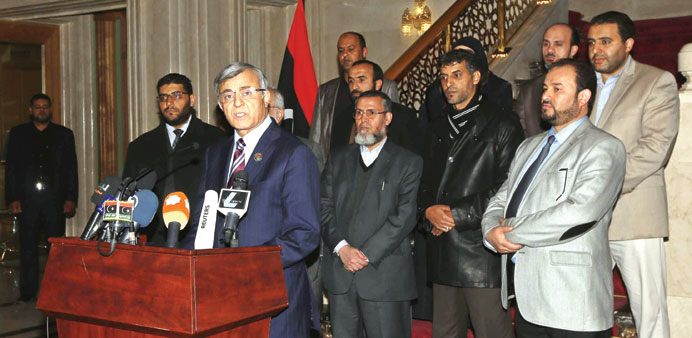The president of the General National Congress (GNC), Nuri Abu Sahmein speaks during a press conference in Tripoli yesterday. Abu Sahmein gave rebels blockading oil terminals in the east two weeks to stand down.
AFP
The president of Libya’s highest political authority yesterday called off plans to assault rebels blockading oil terminals, giving them two weeks to stand down voluntarily or again face military action.
On Monday, General National Congress (GNC) head Nuri Abu Sahmein ordered an assault on rebels demanding regional autonomy in the east and who began exporting oil this week in defiance of the central government.
But yesterday, he said “we have decided to give an ultimatum of two weeks at the most” to lift the blockade.
He added that military action was being suspended for the moment.
But if the ultimatum is not respected, he said “the decision of the chief of the armed forces (Abu Sahmein himself) will be put into action by the Libyan army”.
The developments came as Islamists, buoyed by parliament’s ouster of liberal-backed premier Ali Zeidan on Tuesday, moved to consolidate their new-found power.
Zeidan fled Libya via Malta to Germany, government sources in Valletta said.
The GNC named Defence Minister Abdullah al-Thani caretaker premier for the two weeks it now has to agree on a permanent successor.
But as Zeidan complained repeatedly while in office, real power over the armed forces lies not with the defence minister but with Abu Sahmein.
In the absence of a large enough regular army force to take on the heavily armed rebels, the advance guard of the task force is composed largely of militia loyal to the GNC.
Rebels of the Cyrenaica Defence Force withdrew to the eastern region’s historic border late Tuesday after Libya Shield Force militiamen pushed them out of the central coastal city of Sirte, a rebel commander told AFP.
He warned that the offensive by the fighters, mostly from Libya’s third city Misrata, risked plunging the North African country back into civil war.
The advancing force was “a tribal militia, not a regular army unit”, he said, asking not to be identified.

